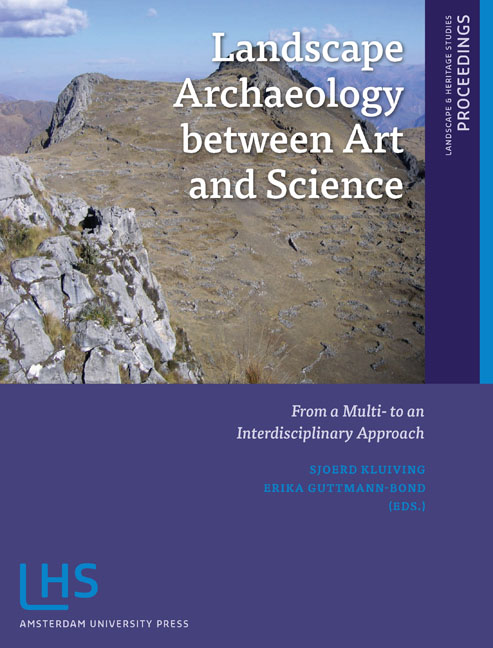Book contents
- Frontmatter
- Contents
- Preface
- Introduction: LAC2010: First International Landscape Archaeology Conference
- THEME 1 HOW DID LANDSCAPE CHANGE?
- THEME II IMPROVING TEMPORAL, CHRONOLOGICAL AND TRANSFORMATIONAL FRAMEWORKS
- THEME III LINKING LANDSCAPES OF LOWLANDS TO MOUNTAINOUS AREAS
- THEME IV APPLYING CONCEPTS OF SCALE
- THEME V NEW DIRECTIONS IN DIGITAL PROSPECTION AND MODELLING TECHNIQUES
- THEME VI HOW WILL LANDSCAPE ARCHAEOLOGY DEVELOP IN THE FUTURE?
- Miscellaneous Endmatter
5.7 - Thinking Topographically about the Landscape Around Besançon (Doubs, France)
Published online by Cambridge University Press: 21 January 2021
- Frontmatter
- Contents
- Preface
- Introduction: LAC2010: First International Landscape Archaeology Conference
- THEME 1 HOW DID LANDSCAPE CHANGE?
- THEME II IMPROVING TEMPORAL, CHRONOLOGICAL AND TRANSFORMATIONAL FRAMEWORKS
- THEME III LINKING LANDSCAPES OF LOWLANDS TO MOUNTAINOUS AREAS
- THEME IV APPLYING CONCEPTS OF SCALE
- THEME V NEW DIRECTIONS IN DIGITAL PROSPECTION AND MODELLING TECHNIQUES
- THEME VI HOW WILL LANDSCAPE ARCHAEOLOGY DEVELOP IN THE FUTURE?
- Miscellaneous Endmatter
Summary
ABSTRACT
This paper focuses on the use of lidar (Light Detection and Ranging) data for the study of rural landscapes in the context of regional archaeological analyses. In particular, we concentrate on using lidar to highlight the importance of activities other than habitation, as well as the use of areas outside the modern ploughzone. It has frequently been said that one of the major challenges to archaeological landscape survey is the incorporation of uplands, marshes, forests and other areas we term ‘outside the ploughzone’. Such areas are normally surveyed primarily through fieldwalking, but we suggest that lidar may make a significant contribution, although there are serious practical and methodological problems to overcome. Further, we argue that including these areas will alter the overall picture of rural landscapes in unexpected ways. The potential and challenges of integrating these areas and activities into landscape and regional scale research are sketched in this paper. We use a recent lidar survey as a case study to explore these issues. The project was funded by the Regional Council of the Franche-Comté for the lieppec project, led by the USR 3124 and LEA ModeLTER, and is based in the hinterland of Besançon, Doubs, France.
The area surrounding Besançon is now largely forested, resulting in a dependence on the interpretation of the lidar model to guide field prospection. This paper provides some early results from the Forêt de Chailluz, north of Besançon; we use lidar to refocus the picture from one dominated by questions of settlement, settlement patterns and agriculture to one incorporating questions about complex networks of sites and activities, distributed across a wider range of landscape contexts. Using these initial results, we reflect on how lidar survey fits into the dynamic area of survey, landscape and regional archaeology.
KEYWORDS
LiDAR, survey, regional perspectives, remote sensing, rural landscapes
INTRODUCTION: LIDAR SURVEY IN REGIONAL AND LANDSCAPE RESEARCH
The archaeological study of local and regional long-term landscape change can be approached from many perspectives. Survey Archaeology, Regional Analysis and Landscape Archaeology are three major, interdependent approaches to this subject, employed to study how people exploited and experienced their surroundings, addressing questions including: How did natural and social resources and contexts influence the creation and development of settlement? Conversely, how did past societies manage and develop their surroundings to reshape the landscape? How are the cumulative results of these actions reflected in the modern landscape?
- Type
- Chapter
- Information
- Landscape Archaeology between Art and ScienceFrom a Multi- to an Interdisciplinary Approach, pp. 395 - 412Publisher: Amsterdam University PressPrint publication year: 2012
- 1
- Cited by



